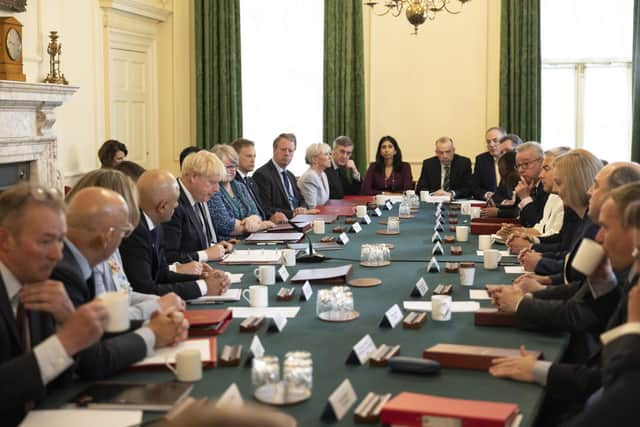Boris Johnson is not the problem. He's just a symptom of Westminster's corrupt system – Joyce McMillan
The other is that Johnson has not yet been replaced as Conservative party leader and may not be for months. He will, therefore, in his inimitably Micawberish way, be hoping that between now and autumn, something will turn up – or can be made to turn up – that will “save Big Dog”, and make Tory MPs and voters fall back in love with him again; and his not-very-humble “I resign” may yet turn out to be Johnson’s biggest lie yet, in a career hardly distinguished by its attachment to the truth.
In giving the assembled ranks of journalists what they wanted yesterday, though, Johnson once again succeeded in deflecting discussion of the systemic problems with the Westminster system that have enabled and supported his more or less disgraceful premiership for the last three years.
Advertisement
Hide AdAdvertisement
Hide AdAfter he made his sort-of-resignation speech, a few Scottish unionists were quick to appear on Twitter offering sarcastic condolences to Nicola Sturgeon, who, they opined, had now lost her single best argument for Scottish independence; but while Johnson certainly is unpopular in Scotland, these comments tend to tell us more about current levels of denial in the unionist camp, than they do about the case for independence.
For the truth about Johnson is that however much of a “character” he is – difficult to dismiss in every sense of the word – his premiership is fundamentally a symptom of all that is wrong with the Westminster system, rather than a cause; and it’s that sense of a system that is no longer delivering for Scotland, and is sometimes failing even to meet minimum standards of 21st century democratic decision-making, that drives support for independence in Scotland, rather than the fate of a single politician, however iconic.
Essentially, the problem with Westminster government is at least four-fold, as some opposition figures – like Andy Burnham, the Labour mayor of Manchester – are now beginning to recognise.
In the first place, Westminster’s overarching principle of the complete sovereignty of that parliament is no longer fit for purpose, in a nation with three other parliamentary assemblies which should, in any well-governed union state, have some entrenched rights which cannot be overthrown by a simple parliamentary majority.


Secondly, the electoral system which gave Johnson his 80-seat majority, on only 43 per cent of the vote, is not good enough in a modern democracy, particularly when it is so regularly used to attack pillars of the UK’s unwritten constitution that the old “gentleman’s agreement” style of politics would have left untouched.
By exaggerating the popularity of the largest party, and awarding it unabridged power, First Past The Post encourages both delusions of grandeur, and the crude marginalisation of opposing opinions, in a way that was problematic even in more consensual times, and is increasingly so now.
Then again, the continuing existence and frequent abuse of the House of Lords, as a way of rewarding donors and cronies as well as distinguished former public figures, is unconscionable in a modern democracy; as is the famous “revolving door” between government and big business, which effectively corrupts the regulatory function of government, undermining its willingness to disrupt and challenge major commercial interests where necessary.
And then finally, there is the utterly toxic relationship between Westminster politics and certain influential sections of the media, which have succeeded over recent decades in moving the general tone of British politics so far to the right that some of us who remember the UK before the 1980s now feel we can barely recognise the place.
Advertisement
Hide AdAdvertisement
Hide AdJohnson’s obsession with this section of the media, and with managing its front-page headlines from day to day, is well known; and if its relationship with its Conservative favourites is unhealthy, its impact on Labour has been even more damaging to British democracy, effectively forcing Labour leaders to adopt right-wing positions, or prepare to be monstered.
Keir Starmer – who has himself adopted some notably right-wing positions in recent weeks, on Brexit, public sector strikes, and the constitution – would be well advised to understand that it was during the Blair premiership, and not under Tory rule, that the SNP began to emerge as Scotland’s largest party; and that the final straw for many Scots, in relation to the Union, is the realisation that any Labour government elected, in this Westminster atmosphere, may well be almost as bad as the Tories.
The solutions to some of these problems are obvious, of course; constitutional reform is possible, and an incoming Labour government may even act in some of these areas – although not, I think, on electoral reform. Others, notably those that involve the activities of a free press, are much more intractable, no matter how much that freedom is abused.
For now, though, those celebrating Johnson’s apparent demise had better put at least some of the merrymaking on hold. For the current Prime Minister is the creation of an arrogant and out-of-date Westminster system, awash with money that comes from those who only ever have their own private interests at heart.
And whenever Johnson goes, we can rest assured that without fundamental reform, the system that bred him will soon be ready to spawn more politicians in his image – ready to put a jovial face on existing patterns of power and wealth, while crushing the rights of ordinary citizens underfoot, and leaving the planet to burn.
Comments
Want to join the conversation? Please or to comment on this article.

